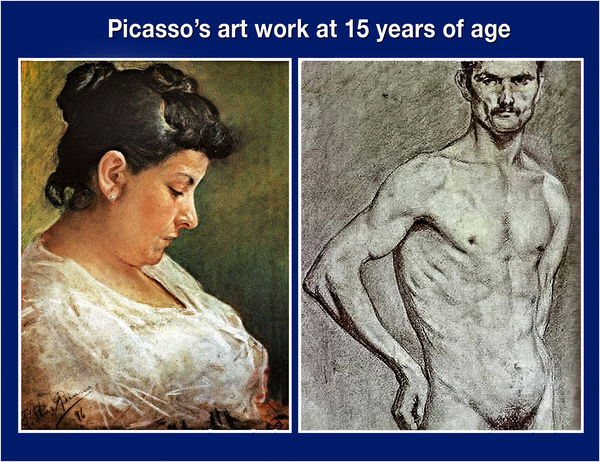Artistic vision - learned or inherent?
Feb 9, 2018 09:17:26 #
gvarner
Loc: Central Oregon Coast
I'm wondering about your experience with this. I think much of artistic vision is inherent but it can be enhanced through formal training. Or is it something that can be developed through training alone? Your thoughts.
Feb 9, 2018 09:21:05 #
Definitely by training, but those who "inherit" the ability, learn quicker.
Feb 9, 2018 09:37:48 #
gvarner wrote:
I'm wondering about your experience with this. I think much of artistic vision is inherent but it can be enhanced through formal training. Or is it something that can be developed through training alone? Your thoughts.
I'd say both. Thinking outside the box was part of my upbringing by an artist father. He never pushed art on me, but it was constantly around me. He gave us art supples but very little instruction. From the beginning my dad learned academically, got an art degree and taught art for 28 years at Texas Tech University. We once had a show together, his painting and sculpture, my photography. He told me at one point that I was the artist that he always wanted to be. He felt that all his art education actually hurt his creativity. I'm self taught (just the way I do things) and work from inspiration rather than intellect. I've also taught photography for 35 years with no formal credentials. It's a difficult balance between "programing a person" and giving the needed instruction. I'm constantly trying to find that balance in my teaching. Go for it and find your way as you go.
Feb 9, 2018 09:47:55 #
I tell my students that I can teach them the technical aspects of photography, and the basics of composition, but I cannot teach them creativity. Each must develop their own style and as long as they are happy with their images, that’s all that really matters (unless shooting for pay!). You can take inspiration from the work of others, and may even try to emulate the work of their favorite artists, but don’t get hung-up on duplicating others work. Each photographer will, over time, develop their own style and through practice and experience, create images that they can be proud of. If others like their work, that’s just icing on the cake.
Feb 9, 2018 09:55:22 #
My experience involves when I was an art director for an advertising department. I hired many entry-level professionals to do digital commercial art and desktop publishing. These positions entailed using programs such as inDesign, Photoshop, etc. In giving them challenging assignments I noticed that it was easier for a technical person to excel on the computer side than on the art side. Those who had good art skills however, had not as much difficulty with designing and could eventually pickup the computer side OK.
Feb 9, 2018 10:03:57 #
Yes...I'm living proof. My mom and her father were both photographers/artists (untrained), but were very good at what they did. I've been doing graphic design for over 20 years (Bachelor of Arts) now, and I some of the things I learned about composition and importance of negative space in college, are extremely helpful in photography.
Feb 9, 2018 10:43:08 #
Comments above seem true to me. I would add that, like music, math, basketball--the inherent skill-level in each has a "topping-out point." Mine, for example, might not be as high as was Michelangelo's.
Feb 9, 2018 10:48:47 #
I believe that we are born with certain proclivities, such as innately understanding compositional elements or color, but that anyone and all of us can improve our skill set with study and practice. Thus, someone with little inclination toward being artistic can become a good enough photographer through developing a good skill set. Will the person without the innate skill ever be better than the person with the innate skill remains to be seen; some people have the born-in talent and don't use it while others strive to be the best and reach a high level of competence.
Feb 9, 2018 11:01:31 #
mwsilvers
Loc: Central New Jersey
gvarner wrote:
I'm wondering about your experience with this. I think much of artistic vision is inherent but it can be enhanced through formal training. Or is it something that can be developed through training alone? Your thoughts.
You can teach the concepts and learn how to use the tools but if you are not blessed with creativity and artistic vision there is just so far that you can go.
Feb 9, 2018 11:05:13 #
Creativity is almost certainly a learned quality. The high percentage of creative artists who come from families with little or no artistic background but supported their children's wish to explore speaks to this clearly. Creativity is more an approach to life than than a built in virtue. Some people learn to think outside the box from a very early age, others learn to stay in the box as a mater of survival. While someone who thinks out side can be pushed back in the box by circumstances at almost any time in their lives, someone who has lived in the box their whole lives may never get out. It is harder to learn to be creative the older you are, but it is not impossible. Read "Drawing on the Right Side of the Brain" by Betty Edwards and "The Artist's Way" by Julia Cameron.
Feb 9, 2018 12:46:34 #
It is a learned skill......it is simply an easy excuse to suggest that it is inherited.....ie no blame!
Show me a family where all children and decendants are 'Artistic' and then consider how many new 'artists' come from families which 'have no historic interest or 'skill' in art. Probably zero for the first and hundreds for the second.
If as a child you are 'exposed' to any of the skills people do - then, if interested, you will also take on those skills. Equally if you want to learn a skill at any age you can do this. 'Being good at' reflects how skilled you have become, rather than genetics.
Art books start with drawing simple squares and circles and then show you how to make them appear 3 dimensional. Composition starts with rules, appreciation starts with looking and learning about techniques. Not what blood group you fall into.
Do not get put off by those who wont be artistic - listen to those who are willing you to BE artistic!
Have fun
Show me a family where all children and decendants are 'Artistic' and then consider how many new 'artists' come from families which 'have no historic interest or 'skill' in art. Probably zero for the first and hundreds for the second.
If as a child you are 'exposed' to any of the skills people do - then, if interested, you will also take on those skills. Equally if you want to learn a skill at any age you can do this. 'Being good at' reflects how skilled you have become, rather than genetics.
Art books start with drawing simple squares and circles and then show you how to make them appear 3 dimensional. Composition starts with rules, appreciation starts with looking and learning about techniques. Not what blood group you fall into.
Do not get put off by those who wont be artistic - listen to those who are willing you to BE artistic!
Have fun
Feb 9, 2018 12:52:42 #
I think something inherent talent-wise is going on with Picasso, Mozart. Picasso's painting of his mother on the left.
dsmeltz wrote:
Creativity is almost certainly a learned quality. ... (show quote)

Feb 9, 2018 13:26:15 #
mwsilvers
Loc: Central New Jersey
G Brown wrote:
It is a learned skill......it is simply an easy ex... (show quote)
Hmmm. I guess then we can all be Mozart, we can all be Rembrandt, we can all be Bill Gates or Steve Jobs? Of course not. Not everyone is creative or has an artistic vision, and all the training in the world will not make it so. Still, non-creative people can develop skills, and an understanding and appreciation of art and creativity, but that's not the same thing as having an artistic vision. I think any differences we are having on this may come down to definitions of exactly what creativity and artistic vision mean
Feb 9, 2018 13:31:41 #
Fotoartist wrote:
I think something inherent talent-wise is going on with Picasso, Mozart. Picasso's painting of his mother on the left.
Picasso had been training for eight years by the time that was painted. His father taught art.
Guess what Mozart's father did. Come on guess.
If you guessed taught music, you win!!!!!
They are actually two of the best examples of talent being taught from an early age.
Feb 9, 2018 13:38:50 #
Instruction is useful at the beginning of the learning curve to provide guidance. However, once a person starts to get their own bearings, the best educator is their own efforts. The most useful input from others at this stage is honest and enlightened feedback from somebody who can point out obvious errors or no-nos, but it's important that the learner sees such feedback as just somebody's opinion. Ideally they will get feedback from somebody whose opinion they can respect, but even then, an opinion is still just an opinion. Too much criticism from a not-like-minded person could stifle the learner's creativity, but on the other hand, being left to continue heading in the wrong direction wouldn't be beneficial. Art is basically subjective, but a learner could end up in a style cul-de-sac if their style is too "unique" (in the euphemistic sense).
Other people's efforts can provide inspiration - as long as it doesn't result in the learner abandoning their own promptings in favour of following (i.e. copying) somebody else's style. Hopefully the learner's own efforts will be accompanied by an improvement (or perhaps refinement is a better word) in their discernment. It's at this stage that the learner will start to realise whether they have something special or not. I suspect that being able to reach the upper levels of the learning curve requires special talent, but having said that, it would be a mistake to underestimate what practice and persistence can achieve.
Innate ability is a factor and influence from teachers and inspirers is a factor, but so are effort and persistence, and with those last two it's possible that there are no limits to how far a learner can advance.
Other people's efforts can provide inspiration - as long as it doesn't result in the learner abandoning their own promptings in favour of following (i.e. copying) somebody else's style. Hopefully the learner's own efforts will be accompanied by an improvement (or perhaps refinement is a better word) in their discernment. It's at this stage that the learner will start to realise whether they have something special or not. I suspect that being able to reach the upper levels of the learning curve requires special talent, but having said that, it would be a mistake to underestimate what practice and persistence can achieve.
Innate ability is a factor and influence from teachers and inspirers is a factor, but so are effort and persistence, and with those last two it's possible that there are no limits to how far a learner can advance.
If you want to reply, then register here. Registration is free and your account is created instantly, so you can post right away.









